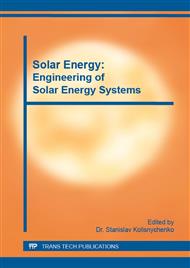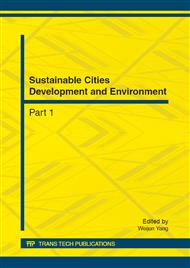p.1836
p.1843
p.1847
p.1852
p.1858
p.1862
p.1867
p.1871
p.1879
A Review of Measures to Encourage the Use of Solar Power for Heating Hot Water and Generating Electricity in Australia
Abstract:
Currently the development of city construction and urbanization is still primarily of dependence on nonrenewable resources, traditionally, fossil-fuel. The detrimental effects consequently emerging on environment call for purifying the process of urban growth. As a typical form of renewable energy, solar power has been incorporated into the development plans in terms of its sustainability, economic advantages and pollution-free. This article contains a detailed assessment of feasibility of solar power at economic level and develops strategies for its implementation in Australia.
Info:
Periodical:
Pages:
1858-1861
Citation:
Online since:
October 2012
Authors:
Keywords:
Price:
Сopyright:
© 2012 Trans Tech Publications Ltd. All Rights Reserved
Share:
Citation:



